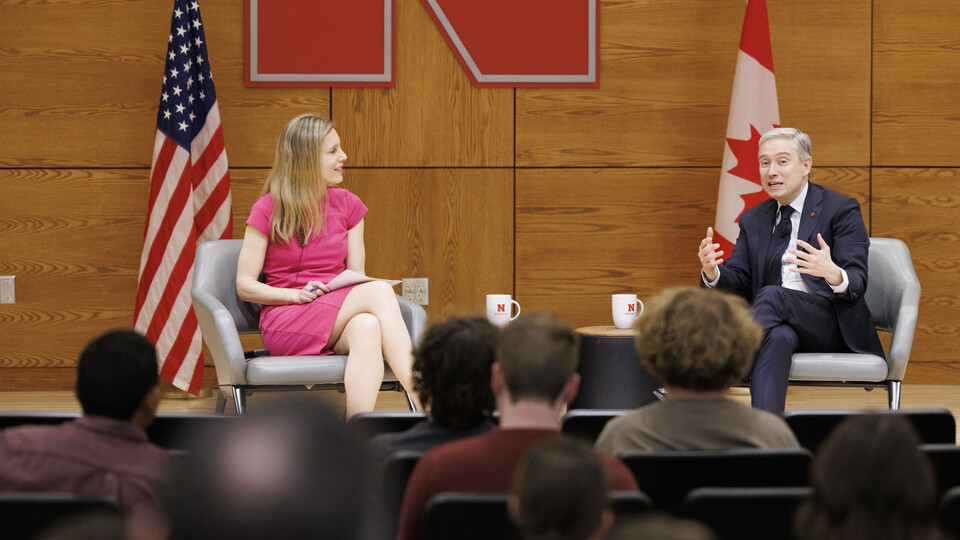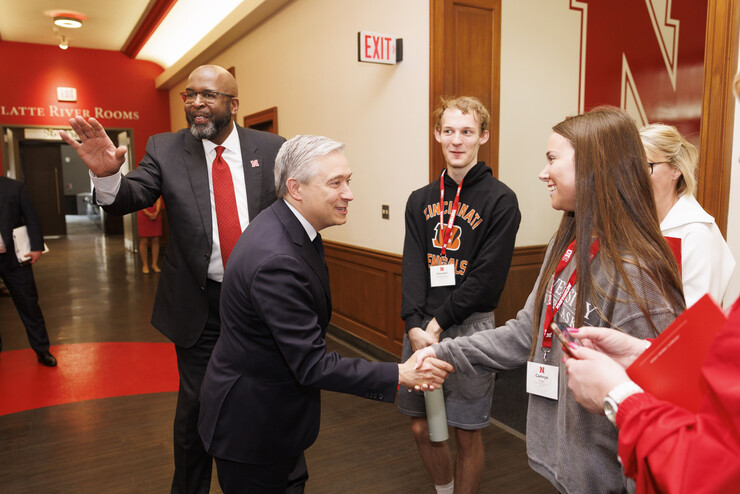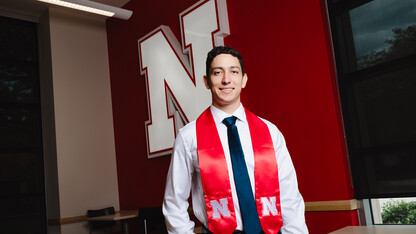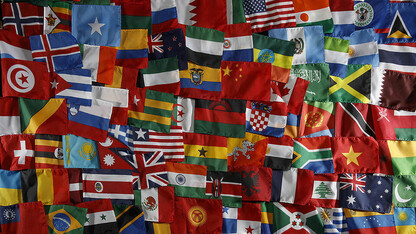· 5 min read
U.S.-Canada trade opportunities are growing, Canadian official says

Global trade conditions give the United States and Canada encouraging new opportunities to build on their close economic relationship, François-Philippe Champagne, Canada’s minister of innovation, science and industry, said during May 3 remarks at the University of Nebraska–Lincoln. Increased U.S.-Canada trade can enhance supply chain resiliency and support the U.S. aim of redirecting its trade toward friendly nations, he said.
“Canada buys more from the United States than China, Japan and France combined on a yearly basis,” said Champagne, who has held various ministerial roles in the Canadian government, including foreign affairs, infrastructure and trade. “Thirty-five states in the United States have Canada as their first export market. So, basically, you’re sitting next to your best customer.”
“Nebraska has the privilege to be centrally located” and is well positioned to be a major player in promoting food security, said Champagne, a Quebec native who has a law degree from Case Western Reserve University in Ohio and has worked in the private sector in Italy, Switzerland and the United Kingdom.
Champagne, who also serves in the Canadian Parliament, spoke in a fireside chat setting with Jill O’Donnell, director of the University of Nebraska–Lincoln’s Clayton Yeutter Institute of International Trade and Finance, in the Nebraska Union’s Swanson Auditorium. The institute cosponsored the May 3 event with the Association of Students of the University of Nebraska.
As the United States redirects more of its trade toward friendly countries, Champagne said, it makes sense to look to Canada, the top export market for the U.S. and Nebraska, and a leading trade partner for both.
Nebraska’s annual exports to Canada top $1.8 billion and recently included $247 million in agricultural machinery, $222 million in natural gas and other gases, $124 million in animal meats and $50 million in insurance services.
O’Donnell said that Clayton Yeutter, the institute’s namesake, cited the 1988 U.S.-Canada Free Trade Agreement as his No. 1 accomplishment in international trade negotiations. Yeutter (1930-2017), a Eustis, Nebraska, native, was a University of Nebraska alumnus who served as U.S. trade representative, U.S. secretary of agriculture and president and CEO of the Chicago Mercantile Exchange.
The United States-Mexico-Canada Agreement, which took effect in 2020, will be up for review in 2026, but Champagne cautioned that the trade pact is working well overall and that tweaks, but not a major overhaul, are needed.
“We have to preserve everything that we have achieved,” he said. “Let’s try not to fix what’s not broken,” he said.
The integration of North American economies under the United States-Mexico-Canada Agreement builds on 150 years of continental trade and is “one of the most consequential agreements in the world,” he said. Trade between the U.S. and Canada totals $3.6 billion a day and more than $1 trillion annually.
“We are integrated in a way that is probably unseen in many parts of the world,” and Nebraska provides a good example, Champagne said.
Omaha-based Werner Enterprises annually ships nearly 20,000 cross-border loads between the U.S. and Canada, according to the Consulate General of Canada in Minneapolis. More than 3,800 Nebraskans are employed by 63 Canadian-owned companies, the Consulate General reported.
“When you look at the state of the world and the geopolitical issues you have, I think that having supply chain resiliency on our shore and integrating between Canada and the United States is the best way to succeed in the 21st century,” said Champagne, who met with Nebraska business leaders during his visit.
Access to critical minerals is one of the central connections linking the U.S. and Canada, he said.
“Of the 30-something critical minerals that the U.S. has identified, about two-thirds are in Canada, and all of them are in North America,” he said.
Champagne directed many of his remarks to students in the audience, which included Yeutter Institute student fellows, as well as several students from Canada. He repeatedly sounded a note of optimism.
“Our best natural resources aren’t underground — they’re above the ground. They are you,” he said.
“The world you’re going to live in will be very different from what you see today,” Champagne said, pointing to the ever-evolving digital economy. “You need to think exponentially. We’re good at thinking linear.”
The 21st century world is closely connected, and “we all have a role to play,” he said. “You cannot insulate yourself.”
Champagne pointed to an example of positive change in his life. In the rural area of Quebec where he grew up, the nearby river for generations was off-limits to the public because it was filled with logs from a timber operation. Now, the area is fully open for public recreation and fishing.
The scene, he said, provides an important lesson: “Don’t be confined by what you see in the world. Imagine the world as you want it to be.”








